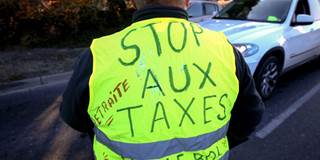Rising fuel prices, whether from reduced subsidies or higher taxes, are tricky to offset, which is why they have spurred social unrest far and wide. What looks new in recent episodes is the sense of political illegitimacy: while paying more is painful enough, not trusting leaders to put the money to good use adds insult to injury.
SANTIAGO – French President Emmanuel Macron is not the first politician to run into trouble over gas taxes. Early last year, striking truckers brought Brazil to a standstill and helped elect uber-rightist Jair Bolsonaro to the presidency. The “Dump the Pump” movement in 2000 looked like it might keep Tony Blair from winning a second term. In the US, the issue is so politically toxic that inflation has been allowed to erode two-fifths of the value of the federal gas tax since it was last updated a quarter-century ago.
I was also once the victim of diesel-fueled rage. As Chile’s finance minister a decade ago, I tried to close a loophole that allowed truckers to get back what they paid in fuel taxes. The government’s political operatives assured me that we would not cave in under pressure. With trucks blocking major roads and supermarket shelves emptying, their iron will melted away in less than an week. Shame-faced, our government retreated, like Macron and so many others have since.
The economics of gas taxes is as old as the politics. The price of fuel in terms of other goods (what economists call a relative price) plays two roles at once. It guides consumption and production decisions: if diesel is dear, consumers will use less and producers refine more of it. It also redistributes income: expensive fuel means that heavy users are “poorer,” because they have less purchasing power left for other items.

SANTIAGO – French President Emmanuel Macron is not the first politician to run into trouble over gas taxes. Early last year, striking truckers brought Brazil to a standstill and helped elect uber-rightist Jair Bolsonaro to the presidency. The “Dump the Pump” movement in 2000 looked like it might keep Tony Blair from winning a second term. In the US, the issue is so politically toxic that inflation has been allowed to erode two-fifths of the value of the federal gas tax since it was last updated a quarter-century ago.
I was also once the victim of diesel-fueled rage. As Chile’s finance minister a decade ago, I tried to close a loophole that allowed truckers to get back what they paid in fuel taxes. The government’s political operatives assured me that we would not cave in under pressure. With trucks blocking major roads and supermarket shelves emptying, their iron will melted away in less than an week. Shame-faced, our government retreated, like Macron and so many others have since.
The economics of gas taxes is as old as the politics. The price of fuel in terms of other goods (what economists call a relative price) plays two roles at once. It guides consumption and production decisions: if diesel is dear, consumers will use less and producers refine more of it. It also redistributes income: expensive fuel means that heavy users are “poorer,” because they have less purchasing power left for other items.